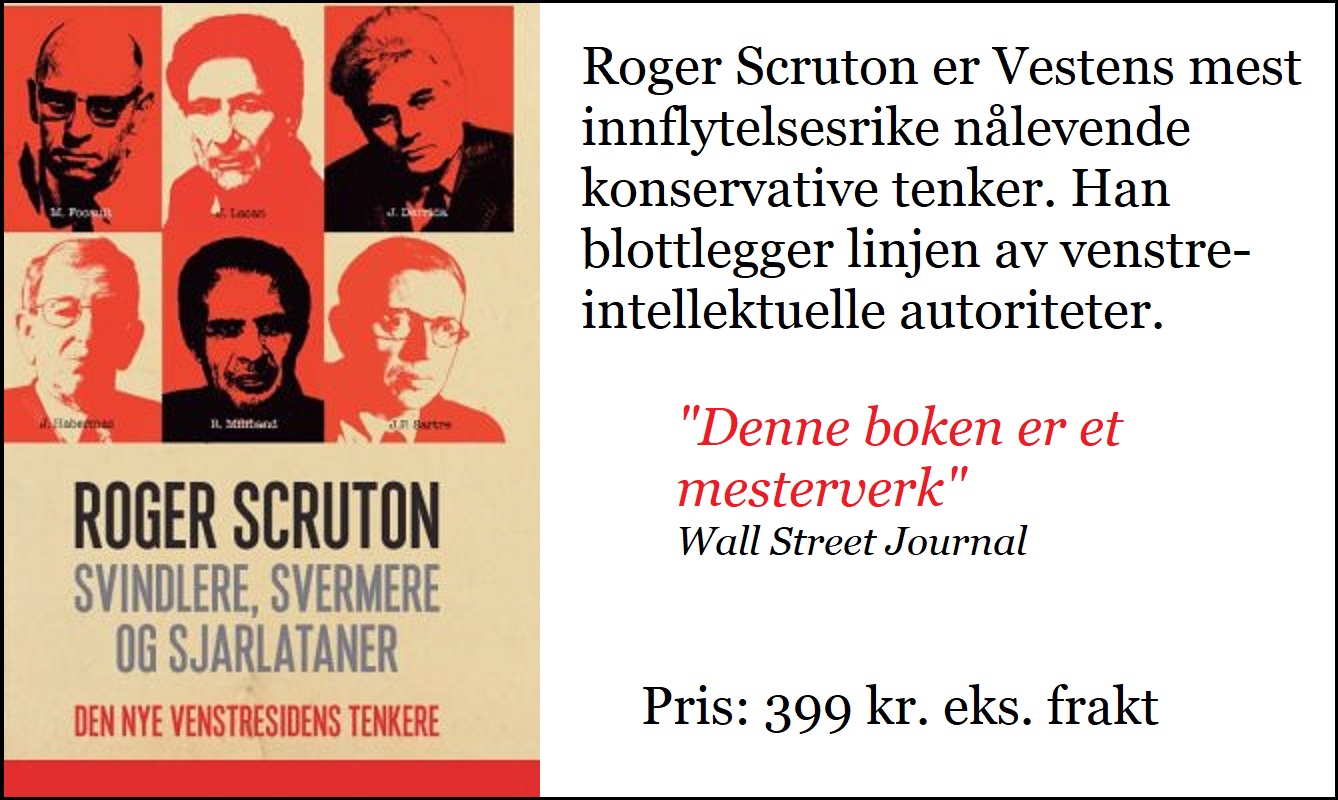
Kopierede/fra hoften
Roger Scruton: “You are accused by the mob, examined by the mob and condemned by the mob…”

Roger Scruton er altid værd at læse, og nedenciterede anmeldelse af Douglas Murrays ‘The Madness of Crowds: Gender, Race and Identity’ opridser fint problemet med de kulturrevolutionære på venstrefløjens overdrev. Fra Unherd – How identity politics drove the world mad.
“We thrive on disagreement, but only if we do not also feel threatened by it. In every period of history, therefore, there have been opinions and customs that are dangerous to question, since they provide the firm foundations on which our disagreements rest. Whether religious or political, these established ways of thinking and acting have been protected by law, and embedded in the educational curriculum and the daily customs of the people.
But our situation in Western democracies today is a novel one. There is no shared religion, and the old customs have been torn asunder by a culture of repudiation, which encourages people to shape their lives according to an ‘identity’ of their own. Socialisation no longer means joining or obeying, but ‘becoming who you are’, regardless of the surrounding norms. This novel situation, which advertises itself as a kind of liberation, has instead produced in my lifetime a totally new kind of censorship and intimidation.
Thirty years ago I naively assumed that, with the collapse of communism, we would no longer see the persecution of dissidents or the imposition of official doctrines, and so I have been as astonished as everyone else by the mass denunciations and targeted character assassinations that enforce prevailing orthodoxies today. They seem as frequent and comprehensive here in Britain as they ever were in the world of totalitarian government.
True, you don’t go to the Gulag for your opinions; nor are there show-trials of ‘deviationists’, Zionists or the running dogs of capitalism. Nevertheless, you have to be careful what you say, and the punishments for saying, thinking or implying the wrong thing, even if administered by private enterprise and social media rather than by the state, are real, serious and largely impossible to deflect.
The archive of your crimes is stored in cyberspace, and however much you may have confessed to them and sworn to change, they will pursue you for the rest of your life, just as long as someone has an interest in drawing attention to them. And when the mob turns on you, it is with a pitiless intensity that bears no relation to the objective seriousness of your fault. A word out of place, a hasty judgment, a slip of the tongue — whatever the fault might be, it is sufficient, once picked upon, to put you beyond the pale of human sympathy.
As Douglas Murray shows in his impressive and lively survey, The Madness of Crowds: Gender, Race and Identity, the emerging world of censorship is a world without forgiveness, in which people are condemned for what they are rather than what they do, and in which the real virtues and vices that govern our conduct are ignored altogether as irrelevant.
The crimes for which we are judged are existential crimes: through speaking in the wrong way you display one of the phobias or isms that show you to be beyond acceptable humanity. You are a homophobe, an Islamophobe, a white supremacist or a racist, and no argument can refute these accusations once they have been made.
… your accusers are not interested in your deeds; they are interested in you, and in the crucial fact about you, which is whether or not you are ‘one of us’. Your faults cannot be overcome by voluntary action, since they adhere to the kind of thing that you are. And you reveal what you are in the words that define you.
These words may be taken out of context, even doctored to mean the opposite of what you said — as happened recently to me in an interview given to the New Statesman — but this will not affect the verdict, since there is no objective trial, no ‘case for the defence’, no due process. You are accused by the mob, examined by the mob and condemned by the mob, and if you have brought this on yourself, then you have only yourself to blame. For the mob is by nature innocent: it washes its own conscience in a flow of collective indignation, and by joining it you make yourself safe.
Such is the situation that the brave Murray confronts in his latest book, the title of which (taken from a previous anatomy of human folly by Charles Mackay) implies that it is crowd hysteria, rather than ignorance, that is largely to blame. But, as Murray goes on to show, that suggestion is also too simple. With admirable attention to detail he explores the ways in which the spirit of the mob has entered not only the language of public debate but also the sources of information and the institutions of decision making.
… More important, from the intellectual point of view, is the attempt to rewrite hardware as software. As Murray shows, identity politics, which insists that everything relevant to our sense of self lies within our power, so that nothing can be imposed on us without our consent, is at odds with the facts of biology. To get round this problem, sex has been re-written as gender, and gender defined as a social construct. In this way, hardware becomes software, and fate becomes choice.“
Kjøp Roger Scrutons bok “Konservatismen” fra Document Forlag her!
Kjøp Sir Roger Scrutons bok “Svindlere, svermere og sjarlataner” fra Document Forlag her!







